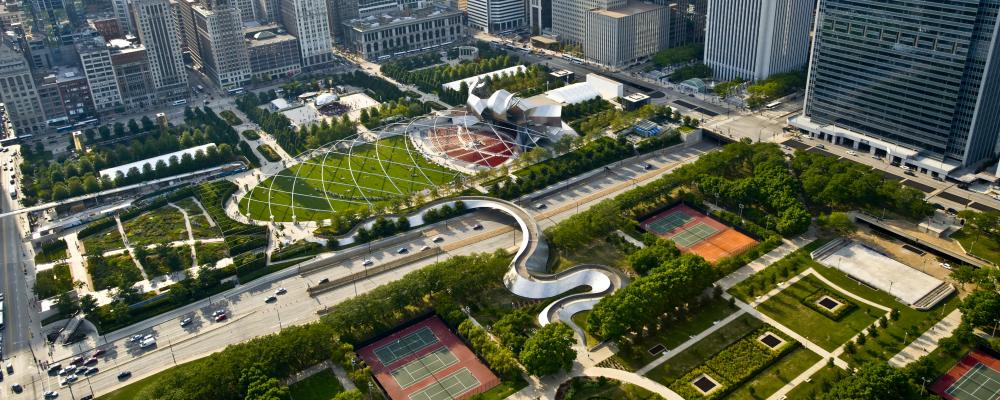Note: Yale School of the Environment (YSE) was formerly known as the Yale School of Forestry & Environmental Studies (F&ES). News articles and events posted prior to July 1, 2020 refer to the School's name at that time.

Population growth, demographic shifts, and changes to the physical landscape are causing rapid and transformative changes in cities across the world. Parks are a special intersection between people and nature within the urban matrix.
At Yale next week, the F&ES-based Hixon Center for Urban Ecology will convene a conference to examine the future of urban parks — and how researchers and practitioners can create and sustain better public green spaces.
The conference, to be held on Nov. 13 in Kroon Hall, will be co-hosted by the New York City Urban Field Station and 21st Century Parks, a Kentucky-based nonprofit that creates and develops new public parklands. View the full agenda.
The event is free and open to the public, but registration is recommended.
”We know that cities are changing, so we need new ideas and new science to respond to those transformations,” said Colleen Murphy-Dunning, director of the Hixon Center. “With this conference, we will bring together scientists and managers to share their understanding and experience of these changes, discuss projections, and hear new ideas for managing and sustaining urban parks to meet future needs.”
The conference will include sessions that address three themes: the relation of parks to internal and peripheral edges within cities, the tension between how wild or structured parks should be, and the question of how to fund parks in a changing governmental and financial landscape.
In the keynote address, Mitchell J. Silver, Commissioner of the New York City Department of Parks and Recreation, will discuss the future of parks and public space. Silver, the former president of the American Planning Association, has helped guide a strategy the redefines the role of New York public spaces in the 21st century.
The closing keynote address will be delivered by Daniel Jones ’06 M.F., Chairman and CEO of 21st Century Parks, which has created an innovative network of urban parks in Louisville that aims to redefine the city’s suburban landscape in a way that “brings nature into neighborhoods.”
Based at the Yale School of Forestry & Environmental Studies, the Hixon Center for Urban Ecology works to understand and enhance the urban environment.
At Yale next week, the F&ES-based Hixon Center for Urban Ecology will convene a conference to examine the future of urban parks — and how researchers and practitioners can create and sustain better public green spaces.
The conference, to be held on Nov. 13 in Kroon Hall, will be co-hosted by the New York City Urban Field Station and 21st Century Parks, a Kentucky-based nonprofit that creates and develops new public parklands. View the full agenda.
The event is free and open to the public, but registration is recommended.
”We know that cities are changing, so we need new ideas and new science to respond to those transformations,” said Colleen Murphy-Dunning, director of the Hixon Center. “With this conference, we will bring together scientists and managers to share their understanding and experience of these changes, discuss projections, and hear new ideas for managing and sustaining urban parks to meet future needs.”
The conference will include sessions that address three themes: the relation of parks to internal and peripheral edges within cities, the tension between how wild or structured parks should be, and the question of how to fund parks in a changing governmental and financial landscape.
In the keynote address, Mitchell J. Silver, Commissioner of the New York City Department of Parks and Recreation, will discuss the future of parks and public space. Silver, the former president of the American Planning Association, has helped guide a strategy the redefines the role of New York public spaces in the 21st century.
The closing keynote address will be delivered by Daniel Jones ’06 M.F., Chairman and CEO of 21st Century Parks, which has created an innovative network of urban parks in Louisville that aims to redefine the city’s suburban landscape in a way that “brings nature into neighborhoods.”
Based at the Yale School of Forestry & Environmental Studies, the Hixon Center for Urban Ecology works to understand and enhance the urban environment.
Schedule of Events
8:00am to 8:30am
Coffee & Registration
8:30am to 8:45am
Welcome
Sir Peter Crane, Dean, Yale School of Forestry & Environmental Studies
8:45am to 9:00am
Keynote Address
Mitchell J. Silver, FAICP, New York City Parks
The Future of Parks and Public Space
9:00am to 10:30am
Panel 1: Parks in Expanding and Contracting Cities
Rebecca Salminen Witt, Director, Greening of Detroit
Lisa Schroeder, Director, Parks and People
Steward Pickett, Distinguished Senior Scientist, Cary Institute of Ecosystem Studies
Moderator
Karen Seto, Associate Dean of Research and Professor of Geography and Urbanization Science, Yale School of Forestry & Environmental Studies
10:30am to 10:45am
Coffee Break
10:45am to 12:15pm
Panel 2: How Wild Can or Should Parks Be?
Suzanne Malec-McKenna, Executive Director, Chicago Wilderness
Dr. Liam Heneghan, DePaul University
Dr. Margaret Carreiro, University of Louisville
Moderator
Mark Bradford, Associate Professor of Terrestrial Ecosystem Ecology, Yale School of Forestry & Environmental Studies
12:15pm to 1:15pm
Lunch
1:15pm to 2:45pm
Panel 3: Sustaining Parks
Sarah Charlop-Powers '09 MEM, Co-Founder and Executive Director, Natural Areas Conservancy
Dr. Mark Wilson, Health Director, City of Birmingham, Alabama
Catherine Nagel, Executive Director, City Parks Alliance
Moderator
Brad Gentry, Associate Dean for Professional Practice, Yale School of Forestry & Environmental Studies
2:45pm to 3:15pm
Closing Keynote
Daniel Jones '06 MF, Chairman & CEO, 21st Century Parks
3:15pm to 3:45pm
Closing Coffee Reception
Published
November 5, 2015